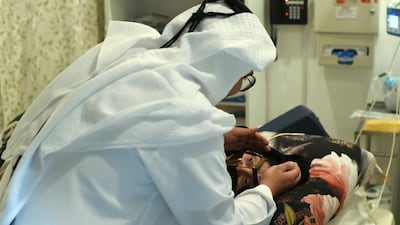An Emirati woman who woke after 27 years in a coma has spoken of her love for her son at a long-term care centre.
Munira Abdulla made global headlines last week when The National revealed how she had regained consciousness for the first time since 1991.
Ms Abdulla suffered a traumatic brain injury at the age of 32 when the vehicle she and son Omar, 4, were travelling in was involved in a collision with a school bus in Al Ain.
Almost three decades later, she woke in a hospital room in Germany to the sound of her son's voice.
Appearing on camera for the first time in Abu Dhabi's ProVita long-term care centre, Ms Abdulla and son Omar Webair, 32, were able to converse, although her speech is strained.
Omar bends down over his mother’s bed asking: “Munira do you love me?”
“Yes,” his mother says.
“I love you more,” he responds with a smile.
“What dress would you like to wear tomorrow?” he asks her. “The red or the green?”
“The green,” she says.
“I know you love me. Right? Let’s read some Quran together,” he tells her.
Munira completes his sentences when he reads out verses of the Quran.
"She's the one who's memorised the Quran, not me," he tells The National with pride. "This is hope. I never lost it and all I want is for others to not lose their hope in their loved ones.
“My mother is living proof that there is always hope."
Mr Webair, a government employee, has been amazed by the reaction to his mother's case, and how millions of people worldwide have read about her.
He also tells of frustration towards doctors who told him there was no hope.
Mr Webair thanks the Crown Prince Court Abu Dhabi, which paid for her treatment abroad.
“Without their support my mother would not have spoken again," he says.
“In spite of everything everyone told me and all the doctors, I knew in my heart that my mother would get well again.
“Please take care of your loved ones who are sick and put yourself in their shoes."
Despite her ability to understand basic conversation and respond to answers, Ms Abdulla, who woke in the Schoen Clinic in Bavaria in June 2018, remains "within the spectrum of minimally conscious state", her doctors in Abu Dhabi say.
Patients in a reduced state of consciousness are usually classed into three categories, all informally described as comas:
- In a full coma, the patient shows no signs of being awake, their eyes remain closed and they are entirely unresponsive to their environment
- A persistent vegetative state includes patients who seem awake but show no signs of awareness
- A minimally conscious state can include periods in which some basic reactions, such as moving a finger, can be seen.
Dr Ahmad Al Khayer, medical director of rehabilitation services at ProVita, says Ms Abdulla was originally treated there between 2011 and 2015, before moving on to other centres, and then Bavaria.
She returned to ProVita in October 2018.
Dr Al Khayer says that before going to Germany, he says she responded to pain and swallowed on occasion – all signs of a minimally conscious state.
He says doctors in Germany reported that she began “tracking her son with her eyes”.
“The important development is that she started to speak," he says.
"She moved from one aspect of cognition to a higher level of cognition, but within the spectrum of minimally conscious state."
This is very unusual but has been recorded before, Dr Al Khayer says.
“We don’t know what caused this," he says. "Is it a change in medication or the growing of new connections in the brain?
"She is not fully aware and not alert, and you need both of those to be in a complete cognitive state."
He says much of her speech is "recorded" – responses given in conversations, such as discussion of her favourite dress, and particularly recitation of the Quran.
“I realise that some of the speech is automatic speech, but to see someone speaking, even short sentences, is very rare [for long-term coma survivors],” Dr Al Khayer says.
“For someone who is 60 years old and with such a severe brain injury, 27 years is a very long time. The prognosis is that she will need long-term support and rehabilitation."

